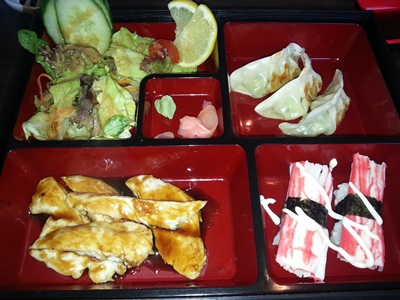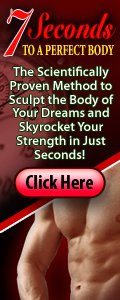Definition of Nutrition
Part 1 - Having Equal Measurement
By Paul "Batman" O'Brien
B.A., N.C.E.H.S., Dip. Acu., Cert Clin. IMed., Dip. Adv. OBB, Dip. CHM, Pn1, PN-SSR, PN-NCA, M.AFPA., M.C.Th.A.
The Definition of Nutrition is;
...the selection of foods and preparation of foods, and their ingestion to be assimilated by the body. By practising a healthy diet, many of the known health issues can be avoided...(Wikipedia)
And that's fine, but it doesn't tell you that much. I mean...
- How do you select your foods?
- What criteria do you use?
- How are you preparing them (cooked, raw, juiced?)
- And what the heck is a healthy diet?
Over the next few articles I am going to share with you my definition of nutrition and better still directly and concretely answer your questions regarding food and nutrition.
The Isometric Diet
I practice what I call an Isometric Diet. Now Isometric from the Greek for "having equal measurement". We use this on this website to talk about a form of exercise - where we contract a muscle but we don't move the joint - a form of resistance exercise in which one's muscles are used in opposition with other muscles. For me, Isometrics are more than just a form of exercise, it's a state of mind and philosophy that can be applied to nearly anything.
Including nutrition.
So here's my Definition of Nutrition:
Any food that provides sustenance, and provides equal measurement to
- longevity,
- health,
- appearance,
- performance and
- vitality.
And that is the basis of my Isometric Diet.
But what does this mean in practice. Well the first focus I have is on my long term health. As many of you know I'm also an acupuncturist and martial artist - two big aspects of my life that require and encourage longevity and health. As an acupuncturist and TCM physician I try to eat according to the nutritional guidelines that suit my TCM constitution. So that's where we'll start....
An Isometric Acupuncturist, Samurai Warrior and Healers Definition of Nutrition...
Yes...that is a bit of mouthful, and while it may seem all those disciplines are at odd purposes they aren't...it's all one and the same. The oldest of the Japanese martial arts, long before modern stuff like Karate and aikido are called the koryu. These are the arts I study.
The Samurai strengthened their bodies using Isometrics, callisthenics and special exercises known as Tanren. (Check out the link between Isometrics and Martial arts - here).
Some samurai were also doctors and physicians, and in feudal Japan the basis of medicine was what we now call Traditional Chinese Medicine...back then of course it was just medicine.
So you see...the martial arts, isometrics and acupuncture are ultimately all expressions of the same principles of good health. ;-)
So this leads me back to the principles of Traditional Chinese Medicine and it's definition of nutrition. Ultimately it's about balance or to put it another way - having equal measurement. ;-)
An Introduction to A TCM Definition of Nutrition
In TCM the foods you eat determine not only how you feel physically but emotionally, and proper food choices and simple things (like enjoying a few slices of ginger in water) can dramatically enhance your coordination, recovery rates, oxygen uptake, reduce injury and more.
In fact if you can get your diet to support your body’s energy systems then genetic factors can be bolstered and you can boost your immunity to your environment.
And that’s not even touching on the general benefits like more energy, improved concentration, better sleep, better digestion...and….well the list just keeps on going.
To understand how the body works and the nature of food, it’s necessary to look at the “Spleen/Stomach”.
The Organ of Adaptation
Human beings are simply marvellous creatures capable of adapting to nearly any environment. Ive seen this very clearly in the progress one experiences through the martial arts. We all start out beginners. A mass of flailing uncoordinated limbs that bears little resemblance to the precise controlled movements of the advanced black belt. Yet through continued practice and repetition we adapt. We learn and evolve into martial artists capable of executing a given movement with control, timing poise, grace and more. And, this ability to adapt and learn, surprisingly, is facilitated by our Spleen and our Stomach.
Now I know that must sound strange. From a western perspective an organ is physically located in the body at a specific place and carries out specific physiological function, and that’s all there pretty much is to it. Traditional Chinese Medicine on the other hand is far more complex.
In the TCM way of thinking an organ is a set of properties and functions that effect and influence many parts of the human body and have physical, mental and emotional aspects to them. While that may sound odd, it is often well understood on an instinctive unconscious level as we’ll see shortly.
The Spleen’s primary functions are in adaptation, nourishment and support – the primary functions we need to survive, and of course each of these displays both physical and mental manifestations. Taking the more familiar physical aspects first, the Spleen is involved in the transformation of food and it’s transportation around the system.
This is primarily through its connection with the Stomach, as all organs in the Chinese Medical System must be balanced and paired, and the Spleen and Stomach are often referred to as one organ in TCM. In TCM once food is ingested it is “rottened and ripened” in the stomach and turned into a warm soup. From this warm soup the Spleen extracts “Fu Qi” (the TCM equivalent of amino acids, sugars, fat, vitamins and minerals). It then transports this “Fu Qi”, simply the energy derived from food.
The stronger our Spleen is the better our digestion and the more nourishment we can take from our food. In one way it could be said it is less important how good a food is for us but rather how strong our and skilled our Spleen is in deriving nourishment from it. The first order of business for the those looking to lose weight and get in better shape then, should not be in making radical changes to what is eaten but should be in learning how to maintain and nourish the Spleen, something we will learn how to do in the next article.... ;-)
You've been reading about the Definition of Nutrition. See how Martial Arts define Exercise here.









New! Comments
Have your say about what you just read! Leave me a comment in the box below.